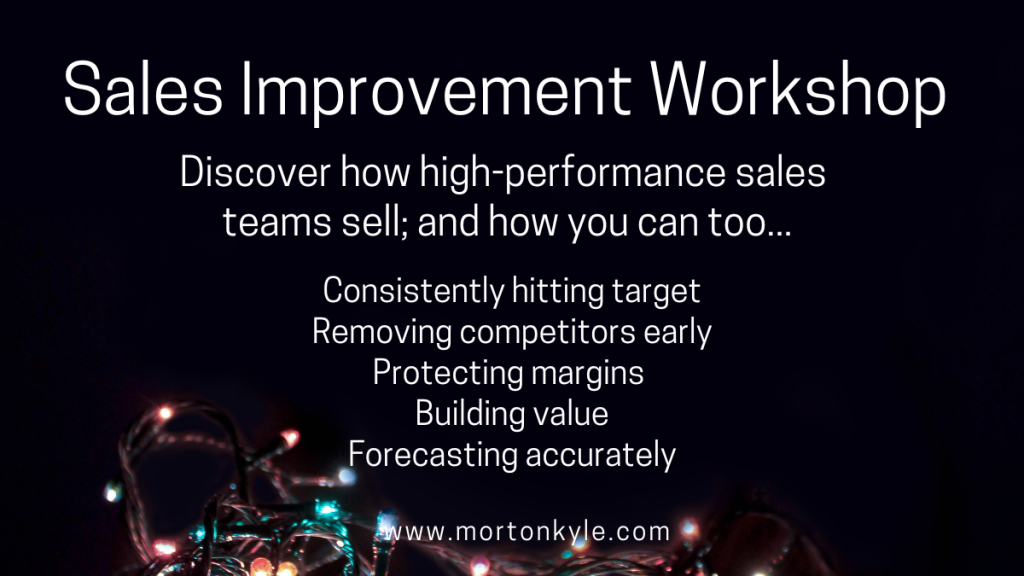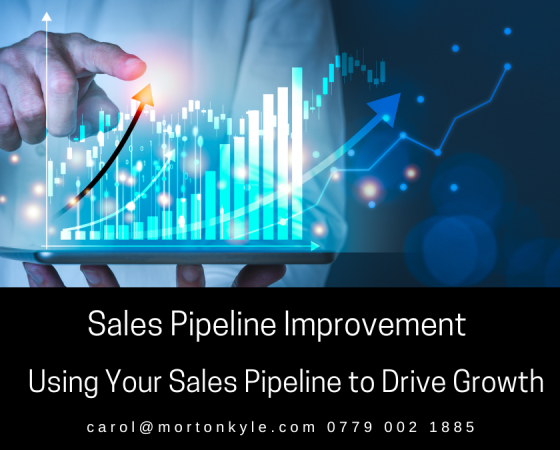Sales pipeline improvement is that untapped area, ripe for accelerating sales growth, yet so few sales sales teams fully exploit it to the extent they could, and therefore miss out on opportunities to grow at a faster rate.
From my experience with sales teams – both ambitious high performing sales teams, and those struggling to get out of the blocks – I’ve drawn some conclusions around why sales pipeline improvement is something lots of organisations strive for but few actually dig into. I’ve identified three critical areas – areas that weaken any sales function, yet, once they are fixed can lead to huge uplifts in sales performance, outlines below, see what you think.
Further down, because I want to give you something practical to work on with your team, I’ve included some questions you might want to spend some time discussing with your sales team in pursuit of the perfect, high converting sales pipeline.
But, first of all, let’s look at those blockers that might be holding you back
Sales Pipeline Improvement Blockers
Typically these are split down into three areas:
- Fear of missing out
- Lack of clarity around the ICP
- Poor sales qualification process – this splits into two areas – pre-call and in-call.
Now – let’s look at these trip points in a bit more detail:
FOMO – Fear of Missing Out
One of the key foundations associated with getting your sales pipeline in tip-top condition is that you need to (see below) ignore some of the leads that drop into the top of the sales funnel. If you’re like me then you want to convert everything that comes across your desk. But, in the pursuit of a high converting sales pipeline, you just can’t. You need your times, best attention and focus, as well as your critical resources just to focus on the leads you know you can convert, convert easily and convert at a good price and margin. This takes discipline, judgement and a sure fire way of separating the wood from the gtrees (your sales qualification process)
Not being clear on your ICP
Your ICP, Ideal Client Profile, is your North Star. If the lead is not your North Star, then recognise it will be tougher to convert than a 100% ICP lead. So, I’m not saying ditch every single non-ICP lead – but just be aware of how much flex you’re allowing in terms of near-ICP’s entering your sales pipeline, because, if you have too many, it will kill your sales conversion rate, increase your sales cycle duration and possibly increase your discounts. ICP definition and adherence is critical. Remain true to your ICP at al costs, and monitor what you’re classifying a near ICP’s as that could be a whole new ICP in itself.
Poor Sales Qualification Process
It’s all well and good having a great ICP and being smart with who and what you let into your sales pipeline, but the devil is in the detail.
What does your sales qualification process look like?
It should be detailed and robust enough so you know what opportunity you are dealing with, where they are in their buying process and how they want to proceed based on what they are looking for.
Now, for this part of the sales qualification process, there are two very distinct elements.
1. Sales Qualification Using MEDDIC
There is the initial screening you do as part of your prep before engaging. It’s the questions you ask yourself before you dive in. Put simply, it’s your first ‘go/no go’ gate, and you can lean more about that here Sales Performance Optimisation Using MEDDIC
Just as there are certain shops or restaurant types you don’t visit because the ‘fit’ is not there, then it’s the same with sales leads, but in this case, it’s a solid process of evaluation you follow to ‘score’ a lead / opportunity before you do anything else.
2. BANT – In-Call Sales Qualification
For the sales qualification process that takes place once you’re in the sales call then check out the link – BANT and the Art of Great Sales Qualification Questions
Being able to strongly qualify at every single stage of the sales process and again all through the sales process is critical if you want to keep your sales qualification process and your sales pipeline clean, after all, agendas change, power struggles ensue, priorities move at every stage in the sales process, so continual qualification is a solid sanity check. Plus it helps you maintain a valuable and predictable sales pipeline that converts at an expected rate with a stable output output…which is what you want
Summary: Sales Pipeline Improvement Blockers
In summary – these are the three key reasons why sales pipelines are messy, unpredictable and unstable, and why accurate sales forecasting eludes so many organisations.
Fix these. and your sales operation becomes much more transparent, and there are immediate easy wins.
Wins typically including, but not limited to:
- Stronger and more accurate sales forecasts
- More predictable and stable sales pipelines – sales pipelines you can have faith in to deliver
- Shorter sales cycles
- Less discounts
- Lower client acquisition costs
- Higher sales conversion rates
- Increased staff motivation and wellbeing
- Bigger commission payments (every cloud :))
The spin off benefits of drilling down into the mechanics of your sales pipeline management process and especially your sales qualification process is a game-changer for your sales team with multiple pay backs that kick in immediately.
And finally,
I think we sometimes forget the cognitive load that happens when a sales rep opens their CRM and sees 5000 records, the same old names popping up time and time again and that feeling of dread at the end of the day when they have hit their talk time and call stats but have not closed, opened or progressed one single lead. It’s soul destroying.
It’s easy to fix – I show you how to do it on the Sales Improvement Workshop – just two days to set your sales team on the right track and give you everything you need to make these important changes.
Helping Your Sales Team: The Sales Qualification Process
Next, for sales leaders who are ready to supercharge their sales pipeline management, let’s look at a sales qualification process that will support sales pipeline improvement, and deliver all the positives that come from knowing exactly what’s in the sales pipeline.
I’ve included a comprehensive list of 30 essential questions that every sales leader should ask their sales representatives.
You don’t need to get your sales pipeline in order before you use these questions, as they can definitely help you in your build phase.
By probing into various aspects of the sales process with your sales team, you can gain valuable insights, identify bottlenecks, and foster a culture of continuous sales improvement and positive performance management.
You’re also teaching your sales team to think, become self-accountable, and massively aiding their development and growth.
I’ve seen these questions transform sales functions and dramatically improve the quality of conversations at sales meetings, MBR’s and QBR’s…and sales forecasting has been revolutionised.
Try them out…dive in and explore how these questions can help you optimise your sales pipeline health, volume, value and growth potential because all of these will help you drive exceptional sales results.
Managing Your Sales Pipeline to Maximise Growth
Sales pipeline management is a critical aspect of any successful sales strategy.
After all your sales pipeline is how you track the path that your sales prospects take as they move from leads through to buyer (or not!)
So, it’s your sales pump.
It’s the lifeblood of your sales engine – ideally (but rarely) in very simple sales processes, for non-complex sales, your sales pipeline will see a lead drop in the top of the pipeline and drop to the bottom fairly quickly, with as fewer touch points or interventions as possible.
For more complex sales there may be multiple touch points.
For larger sales with rows of decision makers, time driven budgets and larger implementation projects to plan then leads (at various stages of qualification) might sit in the sales pipeline for months and even years.
And I’m sharing this so that you know your sales pipeline should be unique to you, your buyers and the markets you sell in, with their inbuilt benefits and constraints.
There is no, one size fits all!
But there are basic rules around maxing the most of your sales pipeline and using your sales pipeline as an agent for sales improvement
For You and Your Team | Sales Pipeline Management Guidelines
To ensure your team consistently achieves its revenue goals, it’s essential to have a well-structured and efficient sales pipeline, and a great sales qualification process as detailed above.
However, building and maintaining such a pipeline requires continuous evaluation and improvement.
This is where asking the right questions for your sales team comes into play…and a way holding your sales team to account in terms of sales pipeline quality is vital
So let’s set out what we’re looking for….what does good / great look like?
A sales pipeline that:
- Has clear go / no-go gates at each stage…including entry into the sales pipeline
- Has a pre-agreed set of lead criteria associated with each stage that denotes the level of certainty we have about the lead
- A set of actions that happen at each stage that test the validity of the lead and the likely sales conversion
- Is flexible – leads can go up or down the pipeline depending on new information
This is not a comprehensive list.
It’s the very basic level you would expect a sales pipeline to have. BUT get these elements right and you are 80% ahead of most sales organisations I spend time with….
Also note – GREAT sales pipeline management is a state of mind – it’s what great sales people do to convert!
Asking the questions below may shock you at first – but it’s a rapid way of improving the sales team skill set and the ability to accelerate sales growth within your team
Diagnosing Poor Sales Pipeline Management Habits
In the spirit of full disclosure – working with many under-performing sales functions – the health of the sales pipeline is critical in their downfall. Poor sales pipeline habits will cripple the very best sales process, make a mockery of the sales pipeline stages and mean most forms of sales pipeline analysis will yield wildly misleading results (critical if you’re using these with the bank or investors)
But you don’t need to lift the bonnet too high because poor sales pipeline health is very evident.
So, if you’re suffering from:
- Bloated sales pipelines
- Sluggish sales cycle durations
- Inability to correctly forecast for the bank, investors, boards
- Poor / non-stable sales conversion rates
If you recognise any of these signs then this next section will:
- Take you back to basics about good sales pipeline health
- Help you empower your sales team so they can clean up the sales pipeline as they progress
- Give you the skills you need to start changing some of the hearts and minds with regard to how to maximise the usage and benefits of a sparkly clean and super health sales pipeline
Sales Pipeline Management to Sales Pipeline Improvement
Here we’ll delve into the 30 key questions every sales leader should ask their sales representatives.
These questions cover various stages of the sales pipeline, from prospecting to closing deals and beyond. Some sections may be more relevant to you thank others – but have a look at them all to be sure.
By regularly posing these questions to your sales team, you can pinpoint areas for improvement, and enhancement, enhance sales efficiency, and ultimately boost your revenue.
Section 1: Prospecting and Lead Qualification
1. How do you identify potential leads?
2. What criteria do you use to qualify leads as high-potential prospects?
3. Are there any common characteristics or behaviours among leads that tend to convert?
4. How do you prioritise leads within your pipeline?
5. What tools or techniques do you use for lead generation and prospecting?
Section 2: Building Relationships
6. How do you initiate contact with prospects and build rapport?
7. What strategies do you employ to nurture leads over time?
8. How do you tailor your approach to different buyer personas?
9. Can you share any success stories about turning a prospect into a loyal customer?
10. How do you keep track of interactions and conversations with leads?
Section 3: Qualifying Opportunities
11. What methods do you use to assess a lead’s budget and purchasing authority?
12. How do you identify a lead’s timeline for making a purchasing decision?
13. What objections or concerns do prospects commonly raise, and how do you address them?
14. How do you determine if an opportunity should advance in the pipeline or be disqualified?
15. What’s your approach to evaluating competitors and understanding the competitive landscape?
Section 4: Closing Deals
16. How do you tailor your pitch and proposal to align with a prospect’s specific needs?
17. What strategies do you use to overcome objections and objections during the closing stage?
18. Can you describe your negotiation tactics for reaching mutually beneficial agreements?
19. How do you handle the logistics and paperwork involved in finalising a deal?
20. What steps do you take to ensure a smooth handover from sales to the fulfilment team?
Section 5: Post-Sale Relationship Management
21. How do you gather feedback from customers after a sale is completed?
22. What strategies do you use to upsell or cross-sell to existing customers?
23. How do you measure and track customer satisfaction and loyalty?
24. What processes are in place for handling customer complaints or issues?
25. How do you encourage customers to become advocates and refer new business?
Section 6: Analytics and Metrics
26. What key performance indicators (KPIs) do you regularly monitor in your pipeline?
27. How do you use data and analytics to identify trends and areas for improvement?
28. What tools or CRM software do you rely on for pipeline analysis?
29. Can you share any insights from past data that led to pipeline optimisation?
30. How do you communicate pipeline insights and progress to the sales leadership team?
Conclusion | Using Good Sales Pipeline Management Habits to Drive Sales Performance Improvements
Asking these 30 essential questions to your sales team can be a transformative step toward enhancing your sales pipeline management, and accelerating the growth of your revenue, margins and market share.
By understanding each stage of the pipeline more deeply, AND HOW YOUR SALES TEAM OPERATE IN THESE STAGES can can unlock sales in even the most complex of sales pipelines
Over a longer term, by addressing pain points, and leveraging data-driven insights, you can create a dynamic sales environment that drives revenue growth.
Remember, “Sales Pipeline Management” is not just another way of describing how your sales leads move from the top to the bottom of the pipeline but the fundamental sales conversion engine in a thriving sales operation.
Continue to ask these questions regularly, adapt your strategies accordingly, and watch as your sales team excels in reaching new heights of success.
And, as an additional benefit, it’s highly likely you, your sales team and the prospects will enjoy the process more too!
Discover how to optimise your sales pipeline today and unlock your team’s full potential.
Sales Pipeline Improvement and Sales Qualification Process – Do You Need Help?
If you’re looking to develop stronger habits around your sales pipeline management, sales qualification process or thinking about how you can better use your sale pipeline to improve sales performance in your team, then we have a range of solution to help you.
If you are in the dark in terms of what is in your sales pipeline in terms of revenue, margin, sales opportunities and you want to detailed analysis around unlocking your sales growth then take a look at our Sale Audit Service to benchmark your sales performance and start the sales pipeline improvement process.
In addition to that, one of the easiest ways to get started is to book your sales leadership team and your sales reps all on to the Sales Improvement Workshop – high impact, practical and designed to cover much of what we’ve talked about above – check out the link.

The Sales Improvement Workshop if for you if you’d like to keep your competitors awake at night!
You can check availability by calling Carol on 0779 002 1885

Hi, welcome to Morton Kyle Limited.
As Founder and Lead Consultant, I’ve spent the last 30+ years in the trenches of sales—fixing broken pipelines, rebuilding underperforming teams, and helping businesses close more deals at higher margins.
I’ve worked with global brands, challenger firms, and fast-growth sales teams, helping them:
✔ Fix underperforming pipelines – turning ghosted leads into closed deals.
✔ Increase win rates – without discounting or chasing bad-fit prospects.
✔ Build sales systems that actually work – so you don’t waste time on ‘busy work’ that doesn’t convert.
I’m not another ‘sales trainer.’ I don’t teach theory. I fix sales problems – fast. And if you’re still reading, it means you’ve got a problem that needs fixing.
I know how sales leaders think because I’ve been one. I know what the board wants because I’ve sat in those meetings.
And I know what works – because I’ve done it, tested it, and proved it across industries, markets, and economic downturns.

